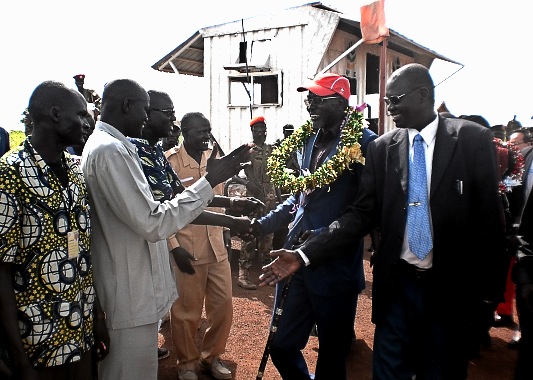Juba – The oil production in Bentiu, the capital of Unity state which was halted due to last year’s political crisis will soon re-start production, according to the Minister of Petroleum and Mining, Deng Dau.
Unity state produces around 15 percent of South Sudan’s oil, while Upper Nile produces the remaining 85 percent. The fighting in Bentiu last April forced many foreign oil workers to flee and oil production had stopped.
According to the minister, preparation steps are in place for the oil to be pumped and production is expected to increase and fill the gap caused by the fall in oil prices globally.
“We have now cleared and the assessment is being done by the operator. We are preparing to resume in Bentiu to compensate the falling prices,” Dau said.
The minister said everything is now ready: “We got report from the operators, they are clearing and cutting the grass everything is okay and ready to resume.”
On the falling oil prices globally, the minister said South Sudan, being an oil producing country, is impacted by the drop in prices like any other oil producing country.
“Almost 35 percent to 40 percent will be the gap due to the fall in oil prices. It will be compensated by producing more.”
He added that production in Upper Nile still remains at 160,000 barrels per day with no improvement as was expected by the finance minister while presenting his budget to Parliament.
South Sudan’s Parliament is worried about the falling oil price. Crude oil dropped another four percent on Thursday to a four-year low of $74 a barrel.
The oil price has dropped by more than 30 percent since June, when it stood at $115 a barrel.
This is bad news for oil producing countries, particularly South Sudan, the most oil-dependent country in the world.
Goc Makwach, the chairperson of the finance committee in Parliament, said it would affect the budget estimates and that they advised the Government not to rely on one source of revenues only.
Oil revenues represent 68 percent of total government income this financial year–estimated at SSP12.7 billion.
This estimate assumes that production in the Upper Nile fields will increase from 180,000 to 220,000 barrels per day by June 2015.
It also assumes that production in Unity state will resume, starting from 5,000 barrels per day and rising to 40,000 by the end of December this year.
Currently, production in the Upper Nile fields stands at 160,000 barrels, while oil production in Unity state remains shut down.
A 30 percent drop in oil prices means South Sudan currently generates only SSP700 million a month from oil revenues, far below the expected SSP1 billion.
It is not clear how the Government plans to fill the deficit. It is already struggling to secure SSP3 billion in loans to finance the budget.
It is also struggling to generate SSP2.6 billion in taxes and fees, more than double last year’s, which some considered over-optimistic considering the ongoing conflict.
The bulk of this year’s budget is taken up by salaries and operational cost of the various ministries and government institutions as well as the army and the police.
The government has just reversed the austerity measures by re-instating housing and other allowances. Makur said it was inconceivable to re-introduce them.
Addressing the shortfall, Makuar said a lot of efforts were being made to increase revenues from taxes and fees.
The vice president James Igga earlier said the Government generates now 3 million SSP daily at Nimule border point when a cleanup was done compared to 400,000 SSP.
He says the Government plans to visit all the border checkpoints specifically Kaya, Nadapal and those bordering the Sudan.
The falling oil price is the third major setback for South Sudan since it gained independence–after the oil shutdown and the conflict.
And it is entirely beyond South Sudan’s control. Analysts point out that the falling price is caused by both higher supply and lower demand.
The world’s slowing economy, particularly in China, and stalled recoveries in Europe and Japan, are reducing the demand for oil.
Others point out that energy-saving measures in rich countries are starting to have an impact. The average new car consumes 25 percent less petrol per mile than ten years ago.
But there has been a big supply shock, too. Global oil production since early 2013 has been running at one million to two million barrels per day higher than in 2012.
This is mainly because the US increased production of shale-oil, to hit 11 million barrels a day this year, overtaking Saudi Arabia and Russia as the world’s biggest oil producer.
Also, surprisingly, war-torn Libya was pumping 40 percent more oil at the end of September than the previous month.
In addition, Saudi Arabia boost output to protect its market share and hurt American shale producers.
Shale oil is relatively expensive, because it comes from many small, short-lived wells. Analysts claim that a third of wells lose money below an oil price of $80 a barrel.
But economists point out that the low oil price may be short-lived. Some American shale-oil producers may lower or stop production because it becomes no longer economically viable.
As war rages on in oil-producing Iraq and Libya, and Nigeria grapples with an insurgency, supply is vulnerable to chaotic forces.
Petroleum minister Dau said the ministry is in the last step for the implementation of the digital licensing system as the legal framework is in place.
“South Sudan wants to start from where others were. It will be one of the best in Africa,” Dau said.
Dau further said the issuance of the license will begin in March 2015 and will cover the entire minerals in South Sudan, “It will be transparent to all stakeholders, the companies, Government and the people.”
By Moi Julius
